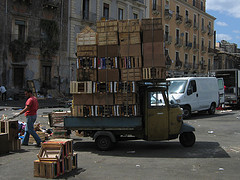 The Adventures of a Shakespearean in the Mediterranean
The Adventures of a Shakespearean in the Mediterranean
I hear it all the time: “Ah, you study Shakespeare and Italy? Well, then you know Shakespeare was Sicilian.” Others are more cautious: “my daughter’s teacher said Shakespeare was Sicilian, what do you think?” By now, the Sicilian authorship theory has been the subject of a documentary on RAI Due and, given the notorious power of television over the Italian mind, the frequency with which I encounter it should not be surprising. Its proponents claim young Sicilian nobleman Michelangelo Crollalanza (Italian for shake spear) emigrated from Messina, found his way into the emerging Elizabethan theatre, and secured an English outlet for his writing by marrying a brilliant translator by the name of Anne Hathaway. What makes it awkward for me is the palpable desire for this story to be true.
There’s no question that Shakespeare was aware of Sicily: Much Ado About Nothing and The Winter’s Tale take place on the island. This does not mean, however, that the world’s most famous dramatist was a native of Messina, the setting for the romantic games of Beatrice and Benedick, anymore than the locale of Hamlet alludes to his Danish origins. What comes to the fore in Shakespeare’s Italianate plays, as I discuss in my new book Shakespeare, Politics, and Italy: Intertextuality on the Jacobean Stage, is the reproduction and elaboration of textual material from previous books. Just like most of his contemporaries, who enjoyed the novelle of Boccaccio and worried about the power politics of Machiavelli, Shakespeare was a voracious consumer of Italian books and English books about Italy. In many ways, the importance of Italy in every aspect of early modern English culture reflects the provincialism of that island, watching the intellectual ferment of the Renaissance from afar.
As seen on RAI Due:

 I had a keen insight into to the logic of the Italian shopkeeper upon visiting a negozio di casalinghi(housewares store) which was filled with decades old products. My wife, an enthusiast of Italian designer housewares like Alessi and Guzzini, was stunned to see products she remembered from her childhood. “It looks like a museum of the 1980s”, she whispered as she picked up a faded box containing an old Guzzini breadbox, “my mother threw this away years ago”. The products were so old that none of them were made in China. The toy section was even more historic. As a Canadian I was amazed to see a ye olde knockoff tabletop hockey game in the Italian provinces. If it had been
I had a keen insight into to the logic of the Italian shopkeeper upon visiting a negozio di casalinghi(housewares store) which was filled with decades old products. My wife, an enthusiast of Italian designer housewares like Alessi and Guzzini, was stunned to see products she remembered from her childhood. “It looks like a museum of the 1980s”, she whispered as she picked up a faded box containing an old Guzzini breadbox, “my mother threw this away years ago”. The products were so old that none of them were made in China. The toy section was even more historic. As a Canadian I was amazed to see a ye olde knockoff tabletop hockey game in the Italian provinces. If it had been 





 The famous television producer Brionvega,
The famous television producer Brionvega, 







Latest Comments